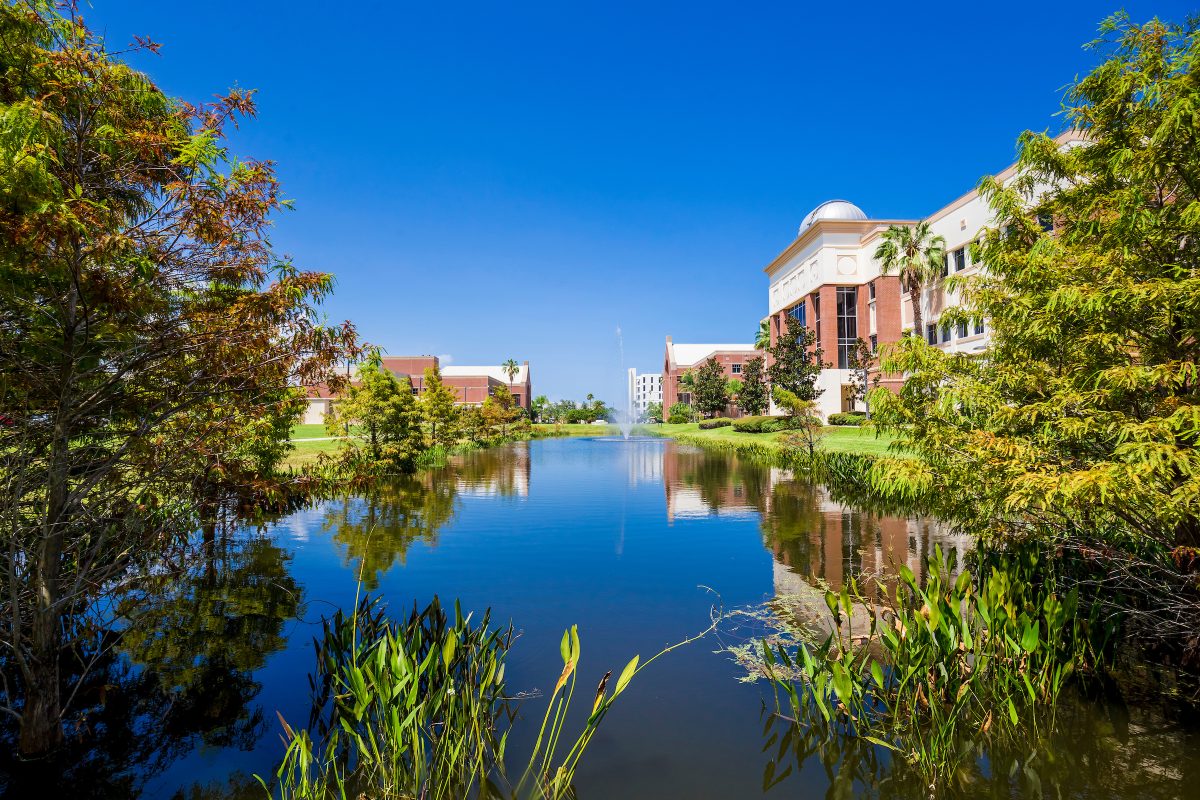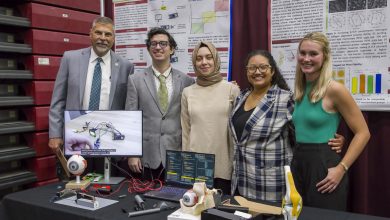Sustainability by Design
With sustainability at the forefront of many business and research initiatives, environmentally conscious solutions are in high demand. Students at Florida Tech are developing concepts that could help meet that rising demand.
The recently completed Northrop Grumman Engineering & Science Student Design Showcase included seven projects from Florida Tech’s Sustainability exploring sustainability in government, campus business, non-profit and regional sectors.
Katie Reed, a senior with a duel major in sustainability and civil engineering, worked on a project creating municipal sustainability guidelines for Melbourne Beach. Reed, who worked as a paid intern in conjunction with her project, looked at six goals and objectives for the town: built-in natural environment, energy, transportation, water, waste and community outreach.
Reed chose the project due to the emergence of municipal sustainability plans. She was inspired by Ocean Engineering and Marine Sciences professor Ken Lindeman’s role in co-creating guidelines for Satellite Beach by developing city intern positions for several students. Through Lindeman, Reed was able to meet with Melbourne Beach officials last summer to begin collective research on issues that affect many coastal towns, including sea level rise.
By reviewing sustainability guidelines from cities throughout Florida, and working with Melbourne Beach’s environment advisory board and commissioners on the biggest challenges the town faced, Reed was able to tailor the guidelines to the town’s needs. She looked at how to address issues such as stormwater management, and analyzed development codes that could curtail stormwater from running into the Indian River Lagoon, furthering its deterioration. Reed also assisted with community outreach and education plans.
In May, Reed will present the final sustainability guidelines document to the town commission. The town is also discussing continuing the internship to allow a Florida Tech student to help implement the guidelines.
The
project opened Reed’s eyes to the work involved in municipal government.
“I’ve never really worked in a town government setting before, so I wasn’t familiar
with the processes you have to go through to get things done,” Reed said.
“There are a lot of different levels and rules, so that was something I learned
a lot about.”
Another project from the Sustainability program created Florida Tech’s first greenhouse gas emissions inventory. It was developed by a group led by Hannah Vest, a junior chemical engineering major with a sustainability minor, and included Joe Luya, a junior mechanical engineering major with sustainability minor, and Iven Webb, a junior aerospace engineering major with a sustainability minor. The goal was to analyze the ways the school emits greenhouse gases and lay the groundwork for the school to create a campus climate action plan.
With the help of Florida Tech Director of Facilities Management Dewey Yeatts, Florida Tech project manager Quinn Duffy and others, the team gathered data on the amount of recycled paper Florida Tech purchases, how much fuel the aviation program uses and the type of food purchased by Dining Services.
Similar to Reed’s experience, Vest said it was challenging to gather all the sustainability information. But she said her work will benefit school in the future.
“I think it’s helpful for the school that we started the process, can help them improve on their recordkeeping, and know what sort of information people would need if they did hire a company for it. They would be (better) prepared now,” she said.
Natalie Gadelrab, a junior majoring in ocean engineering with a sustainability minor, developed a sustainable freshwater program for Carnival Cruise Line’s 25 ships for her project. She was inspired by her time as an intern with the company.
In addition to suggesting the use of dish washers and plumbing that is more efficient, Gadelrab and the cruise line studied two options for getting fresh water: From cruise ports in a process called bunkering, or produce it onboard using evaporators or via reverse osmosis systems.
Gadelrab analyzed factors such as inventory of fresh water produced on board, actual and predicted fresh water production and comparisons between the energy usage of reverse osmosis systems and evaporators to identify the best approach.
Her final findings revealed that evaporators were a more sustainable and cost-effective choice of production. Based off the research, Gadelrab proposed a plan that would increase water production efficiency by 20 percent, allowing Carnival to meet its freshwater consumption goals and bunker less water.
“I think it’s really fun to be able to apply what I’ve learned in my classes so far and then be able to make such great connections with companies,” Gadelrab said. “I’m working with Carnival Cruise Line, and to be able to work with a big company and figure out what they need, ultimately just applying what I’ve learned – it’s a lot more fun to do projects than it is to just answer questions.”
###





